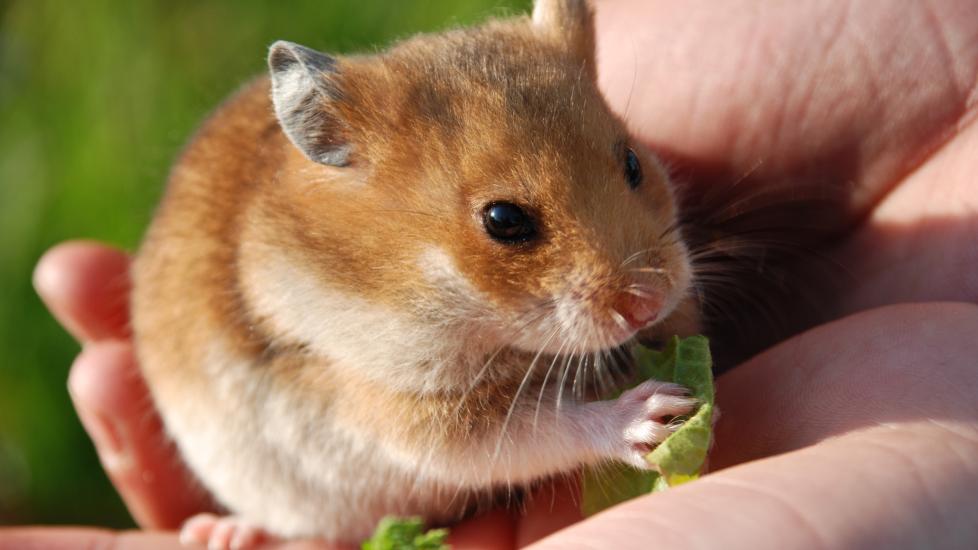Health
Physical, Mental Health of Hamsters and Illnesses
All About Hamster Health And Illnesses
Hamsters have a lot of different nuances to look out for, but because hamsters are prey animals, they will hide their illnesses as best as they can. But fortunately hamsters have a couple of indicators to tell whether the hamster is healthy or not.
Make sure to check your hamster's health and maybe even bring them to the vet when you see anything worrying, as something small can mean something a lot bigger, because they already try to hide what's wrong with them and when it's showing, find a vet.
A Healthy hamster is relaxed, alert and cute!

Physical Health
Here is a list of what physical signs may be a part of a bigger problem, but to prevent any of this, make sure to provide your hamster a balanced diet having a healthy seed mix, fresh vegetables once a week and not any disturbance near where your hamster sleeps. Clean your hamster's water dish almost every day to have clean water and maintain a clean enclosure.
1. Eyes
2. Teeth
3. Fur
4. Weight
5. Respiration
Eyes should always be bright, active and alert and clear of any discharge. Redness on non-albino hamsters and/or cloudiness may be a sign of an infection or an irritation.
Hamsters teeth grow all of their life continously, so providing your hamster a variety of chew toys and chewable materials is necessary.
They do get a bit of grinding from their main seed mix, but providing chew toys as well is also needed.
A healthy hamsters fur is nice and soft, smooth and shiny. Bald patches, dryness or scratching may also be a sign of mites, allergies or severe stress.
Make sure to schedule a checkup at the vet when it's becoming severe, because it's needed to start treatment as soon as possible.
Healthy hamsters will maintain a stable weight through exercising and eating healthy. rapid weight loss and/or gain indicates some sort of illness or dietary imbalance.
Dwarf hamsters healthy weight is 20-45 grams, but can reach up to 65 grams.
A Syrian hamster's healthy weight is 120-200 grams, reaching upwards of 300 grams when bred with good genes and healthy lifestyle.
Healthy breathing is pretty quiet and consistent. Wheezing, sneezing repeatedly or delayed breathing can be a sign of a dusty environment or a respiratory problem overall.
Make sure to provide your hamster a healthy and dust-free environment with the correct bedding to prevent any respiratory issues.
Mental Health
A quick run down on most mental health issues that can happen to your hamster. To prevent most, make sure your hamster's enclosure meets the minimum cage size to avoid stress, give your hamster enough bedding to properly burrow and feel safe and don't disturb them when not needed.
1. Boredom & Stress
2. Social Interaction
Hamsters need spacious cages that meet the minimum cage sizes and enough things to do in the cage, otherwise they may experience boredom and stress. Make sure your hamster gets enough boredom breakers and toys to not feel boredom.
Bored or stressed hamsters may do things such as chewing the bars of the cage or the corner of the enclosure, cage pacing, and similar stress behvarious that indicate boredom and stress.
Hamsters do not need socialisation, because they are solitary animals. But because humans want that, then it's also totally okay. You just have to make sure you tame them properly to not give them any stress.
Handle them gently as well, as they're very delicate and because they don't see further than 15 cm without it being blurry, don't let them fall from tall heights.
Illnesses
Even with great care, they can catch and develop illnesses, and you have to make sure to catch it in time. As far as I know, we can't really catch the illnesses at the same level dogs can smell them, we have to notice any unusual symptoms.
Respiratory Infections
Wet Tail (Proliferative Ileitis)
Dental Problems
Skin and Fur Issues
Digestive Problems
Symptoms like sneezing, wheezing, nasal discharge and lethargy may be a sign of a respiratory infection, the causes can be dusty bedding, anything else that is too dusty and very poor ventilation.
If you see unusal symptoms like those, make sure to contact a vet and isolate the hamster from the current enclosure to a temporary enclosure.
Symptoms like diarrhea, foul smell, loss of appetite and lethargy may be a sign of wet tail, it can be causesd especially in young hamsters under severe stress and/or in dirty environments.
Make sure to immediately contact a vet, as it can be fatal. Immeditate intervention from a vet can safe the hamster's life.
Symptoms like overgrown teeth, difficulty eating, drooling and noticable weight loss may be a sign of a dental problem.
It's probably caused by not enough chew toys, and to fix it give your hamster more chew toys and if it's too severe and won't go away, schedule a vet visit immediately.
Symptoms like bald patches, flaky skin and excessive scratching may be a sign of skin and fur issues. It can be caused by mites, funcal infections, allergies and/or stress.
You'll need to clean everything in the enclosure and consultate a vet.
Symptoms like diarrhea, bloating and loss of appetite may be a sign of digestive problems. It can be caused by poor diet, sudden food changes and/or infections.
Gradually change the diet for the better and meet a vet when symptoms won't go away.
Discussion Board
Share your thoughts, ask questions, and join the conversation below.